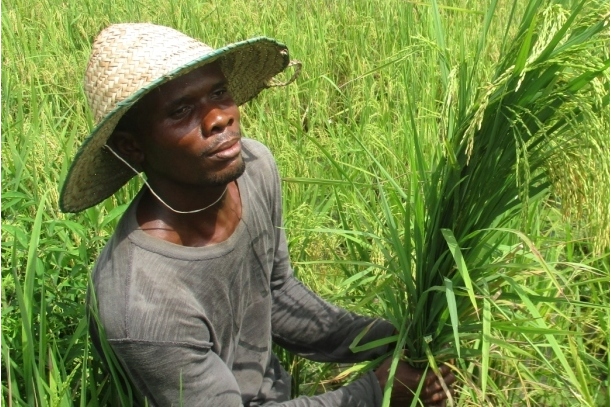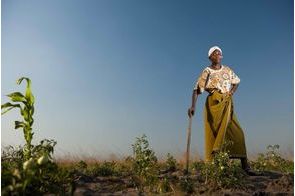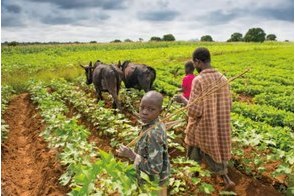Imperative of reforming Nigeria’s agric insurance coverage

Summary
Insurance coverage plays beneficial roles in achieving sustainable food production, creating wealth and reducing poverty.
A small group of farmers in Ekiti, a state in the south-west of Nigeria, cultivated four hectares of farmland and lost nearly half of their cassava plantation to cattle invasion. The crop was eaten up by cows in the first year of its growth cycle. Following the attack, adverse weather conditions delayed harvest and in the early part of the second year, a bush fire wiped out almost half of what was left by the cattle the herders brought in.
After struggling for a year-and-a-half to keep the farm going, the group harvested only 20 per cent of their estimated farm produce. The income from that was not enough to recover their investment capital. Situations like this – and even worse – are the plights of many smallholder farmers in the country. In Nigeria, many smallholder farms do not have insurance coverage.
Many farmers are not aware they can insure their farm produce to protect their capital at the least. Some who are aware say the costs of insurance policies are too high. Others lament about the frustrating process of getting compensations after a disaster.
What this clearly indicates is that, first and foremost, there is a need to create more awareness on farm insurance and its important role in alleviating financial losses. To ensure the viability of agribusinesses and to enable them to create jobs and boost food security, farmers should be informed and encouraged to insure their farms against unforeseen and insurable disasters.
According to the Nigerian Agricultural Insurance Corporation (NAIC), about 250,000 farmers enrolled in the Nigerian Agricultural Insurance Scheme (NAIS) as of the end of August 2020. Nevertheless, the majority of farmlands are still not insured with NAIC or any other insurance company. This is not surprising given the abysmally low insurance penetration in Nigeria as a whole. As of 2019, insurance penetration in the country stood at 0.31 per cent, per the Nigeria Insurance Industry Report by Coronation Merchant Bank (CMB).
Poor understanding of insurance policies and their benefits is one of the reasons for the weak uptake of the financial services offered by insurance companies. Another reason for the low penetration involves misconceptions about the insurance industry. Without these issues and others, more people, including farmers, would have had insurance coverage.
Risks in the agricultural sector further tip the scales against farmers seeking insurance protection from conventional insurers who see the sector as too risky. This is a major challenge that informed the creation of NAIC by the Nigerian federal government. For example, premiums under NAIS are subsidized for all food crops, including cassava, rice, maize, guinea corn, beans, sorghum, yam, soybeans. However, insurance coverage for cash crops such as cashew, cocoa, coffee, etc., are not subsidized.
Furthermore, premiums for livestock, including goats, sheep, cattle, poultry, rabbits and fish are subsidized. But horses, dogs, camels, donkey and other commercial animals are not subsidized. Non-commercial livestock and food crops attract up to 50 per cent subsidies in insurance premiums. Many farmers have no idea this insurance scheme exists.
Agricultural insurance covers disasters such as fire, windstorm, flood, lightning, drought, pest and diseases, invasion of farmlands by wild animals, accidental injuries and death of livestock. There is also coverage for other production, processing, storage and transportation risks that are not willful damages.
Unfortunately, losses resulting from a riot, revolution, mutiny, neglect, and theft are usually not covered under the NAIS. This is a drawback of the scheme that needs to change, especially at this time when not only climate-related disasters – but also persistent clashes between farmers and herders – are causing significant damage to crops and losses for farmers. There should also be insurance policies for serious injuries to, and death of, farmers arising from attacks on them or their families while they are on their farms.
Apart from NAIC, there are several other insurance agents that farmers can work with to insure their produce and even cater for workers to limit the losses caused by unplanned circumstances. Indeed, NAIC does not have the underwriting capacity to provide coverage for all farmers in Nigeria. Hence, it is important for other players besides the government-owned company to participate in expanding coverage for agricultural insurance.
Some of the benefits of insurance to farmers include protection for investment capital, means of collateral security, reduced dependence on government and access to risk management advisory.
Capital protection
When a farm is insured, it gives the farmer the opportunity to recover his/her capital when disasters happen. Guaranteeing some level of compensation to enable the recovery of capital is highly important for the survival of any business, including agribusinesses. While some farmers save up for their start-up funds – usually over a long period of time, many smallholder farmers borrow from credit associations, family members and friends. Wherever the money comes from, owners of agribusinesses, including farms, need insurance coverage to protect their investment. They should be able to bounce back should they suffer huge losses due to attacks or natural disasters.
Collateral for loans
Loans provide the financial resources needed for acquiring farm equipment and machines. They also support daily running costs and maintenance of such equipment, among other needs.
One of the conditions for securing loans from agricultural financing agents is an insurance coverage. With an agricultural insurance plan, financial institutions are more encouraged to support farmers in expanding their output. The credit financiers are assured that in case of a disaster, the farmer or agribusiness owner will be able to pay back the loan.
Reduced dependence on government
Government support in the aftermath of a crisis is often very limited and delayed. An insured agribusiness can get compensation and return to business faster instead of depending on government intervention that may never come. Notwithstanding, the government should speed up response and support to farmers during periods of natural disasters and other crisis.
Farmers across some countries in Africa have been facing locust invasion and infestation of fall armyworm and other cross-border pests. The insect pests have destroyed several farmlands in the region. One sure way to reduce the impact of pests and diseases on food security is providing timely response when these attacks happen. A reliable insurance plan can help in this regard.
Risk management and farm advisory services
Insurance companies require good management practices by their clients. Part of their responsibilities to their farmer-clients is to provide advice on how to reduce agricultural risks and limit accidents. Most insurance companies visit farms or processing industries insured at specified periods for assessment and monitoring. Following such visits, they give professional advice and other services.
Farmers can also visit their insurers and ask for professional advice. Individualized risk management solutions allow farmers to customize their insurance coverage to reflect the potential losses and risks unique to their operations.
Insurance coverage plays beneficial roles in achieving sustainable food production, creating wealth and reducing poverty. Farmers in rural areas who are mostly small and medium-scale farmers already face multiple challenges, including lack of access to low-cost financing. But with or without funds, agriculture is beset with many risks and can sometimes be unpredictable. Hence, farmers in rural areas need to be assisted with affordable insurance policies to reduce the numerous risks they face.
Although getting an insurance cover is highly beneficial for agribusinesses, the barriers to enrollment by smallholders such as high premiums should be addressed quickly to encourage participation. Other challenges such as delays in offering compensations post-disaster should also be addressed to remove the negative perception of the insurance industry.
When flooding destroys a rice plantation, for example, insurance companies should provide insured farmers with enough funds in a very short time to finance irrigation for dry season farming. Inability of the insurers to fulfill this need at the required time can cause setbacks and frustrate farmers whose means of livelihood have been disrupted. It will also adversely affect food production and increase the prices of the affected food crops. In such cases, a farmer might regret paying premiums for insurance altogether.
In conclusion, it is essential for governments at the federal, state and local levels to respond quickly to the challenges that are threatening the livelihood of farmers – and by extension the country’s food security. These challenges include cattle invasion, flooding, droughts, wildfires, pests and diseases and other natural shocks. Ethnic conflicts in some communities also pose risks to the country’s agricultural output.
More awareness and education of farmers with regard to climate change and disaster risk management will help in safeguarding against the economic shocks caused by climate events and other crisis situations. Supporting farmers to expand agriculture insurance is also key.
Financial Nigeria Columnist, Mojisola Karigidi, is a Nigerian biochemist and the founder and product developer at Moepelorse Bio Resources. She is also a Global Innovation Through Science and Technology (GIST) awardee, and an Aspen New Voices fellow.
Related
-
The need for women entrepreneurs, innovators and leaders in Africa’s agriculture
Women contribute on the average 40 per cent labour participation in the agriculture sector in sub-Saharan Africa. ...
-
Optimising wet period for dry season farming
Plans for 2024-2025 dry season farming should by now be underway by concerned ministries, including the ministry for ...
-
Why contract farming is necessary in Nigeria
More food processing companies in Nigeria should be encouraged to enter into partnership agreements with smallholders.








